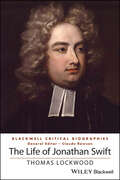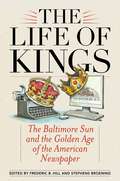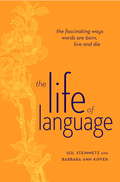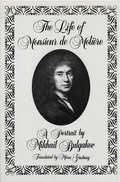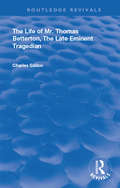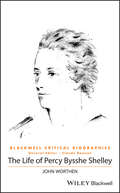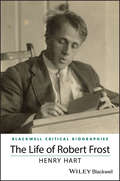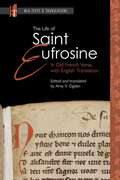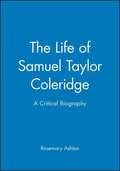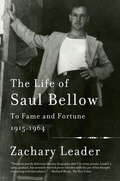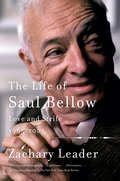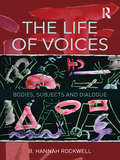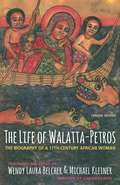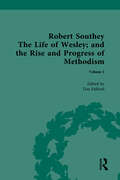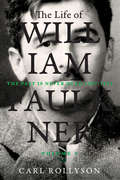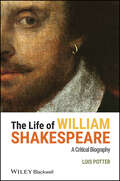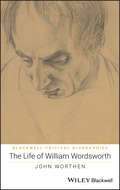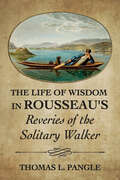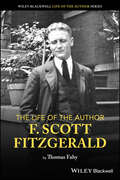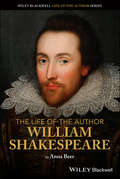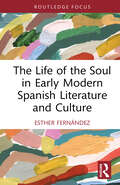- Table View
- List View
The Life of John Bunyan
by Edmund VenablesJohn Bunyan was an English 17th century Christian writer and preacher. He is best known for his allegory The Pilgrims Progress. Bunyan wrote this book while being imprisoned for preaching without a license. This confinement lasted 12 years. In his autobiographical book, Grace Abounding, Bunyan describes himself as having led an abandoned life in his youth, and as having been morally reprehensible as a result. After contemplating his acts as a youth he became a Baptist. In 1655 he became a church deacon and began preaching. His biography is an excellent historical look at the changing views in religion in the 17th century.
The Life of Jonathan Swift (Wiley Blackwell Critical Biographies)
by Thomas LockwoodPresents a fresh account of the life history and creative imagination of Jonathan Swift Classic satires such as Gulliver’s Travels, A Modest Proposal, and A Tale of a Tub express radical positions, yet were written by the most conservative of men. Jonathan Swift was born in Dublin and spent most of his life in Ireland, never traveling outside the British Isles. An Anglo-Irish Protestant clergyman, he was a major political and religious figure whose career was primarily clerical, not literary. Although much is known about Swift, in many ways he remains an enigma. He was admired as an Irish patriot yet was contemptuous of the Irish. He was both secretive and self-dramatizing. His talent for friendship was matched by his skill for making enemies. He hated the English but yearned to live in England. The Life of Jonathan Swift explores the writing life and personal history of the foremost satirist in the English language. Accessible and engaging, this critical biography brings Swift’s writing and creative sensibility into the narrative of his life. Author Thomas Lockwood provides the historical and modern critical context of Swift’s prose satires and poetry, as well as his political journalism, essays, manuscripts, and personal correspondence. Throughout the book, biographically contextualized descriptions of Swift’s most famous works help readers better understand both the writing and the writer. Provides critical profiles of Gulliver’s Travels, An Argument Against Abolishing Christianity, Drapier’s Letters, and Swift’s other famous works Offers insights into Swift’s relationships with Esther Johnson, “Stella,” and Esther Vanhomrigh, “Vanessa” Highlights Swift’s poetry and how verse writing was a vital part of his creative being Summarizes and contextualizes lesser-known works such as The Conduct of the Allies Addresses the historic critical bias against comedy or satire as inferior forms of art, both in Swift’s lifetime and the presentThe Life of Jonathan Swift is an essential resource for general readers of literature and literary biography, university instructors and researchers, and undergraduate students taking courses in English literature.
The Life of Kings: The Baltimore Sun and the Golden Age of the American Newspaper
by Frederic B. Hill Stephens BroeningIn an age when local daily papers with formerly robust reporting are cutting sections and even closing their doors, the contributors to The Life of Kings celebrate the heyday of one such paper, the Baltimore Sun, when it set the agenda for Baltimore, was a force in Washington, and extended its reach around the globe. Contributors like David Simon, creator of HBO’s The Wire, and renowned political cartoonist Kevin Kallaugher (better known as KAL), tell what it was like to work in what may have been the last golden age of American newspapers -- when journalism still seemed like “the life of kings” that H.L. Mencken so cheerfully remembered. The writers in this volume recall the standards that made the Sun and other fine independent newspapers a bulwark of civic life for so long. Their contributions affirm that the core principles they followed are no less imperative for the new forms of journalism: a strong sense of the public interest in whose name they were acting, a reverence for accuracy, and an obligation
The Life of Langston Hughes: 1941-1967
by Arnold RampersadVolume II catches up with Hughes in Harlem, the Harlem Renaissance and his relationships with other writers, including Richard Wright, Ralph Ellison, James Baldwin and Amiri Baraka.
The Life of Language
by Barbara Ann Kipfer Sol SteinmetzIf time travelers from the nineteenth century dropped in on us, our strange vocabulary would shock them just as much as our TVs, cars, and computers. Society changes, and so does its word stock. The Life of Language reveals how pop culture, business, technology, and other forces of globalization expand and enrich the English language, forming thousands of new words every year. In this fascinating and jargon-free guide, lexicographers Kipfer and Steinmetz reconstruct the births of thousands of words, including infantries, poz, mobs, Soho, dinks, choo choos, frankenfoods, LOL, narcs and perps. · A word lover's guide to etymology, written in a fun, informal, and accessible style· An excellent resource for vocabulary building; a word's root helps readers understand its meaning· Beautifully packaged paperback with French flapsFrom the Trade Paperback edition.
The Life of Monsieur de Molière: A Portrait by Mikhail Bulgakov
by Mirra Ginsburg Mikhail Afanasevich BulgakovThis portrait of Moliere, by Mikhail Bulgakov, goes far beyond mere biography. The Russian master brings a kindred spirit vividly to life in this novelistic story of art and the struggle it demands. Mikhail Bulgakov’s The Life of Monsieur de Moliere is a fascinating portrait of the great French seventeenth-century satirist by one of the great Russian satirists of our own century. For Bulgakov, Moliere was an alter ego whose destiny seemed to parallel his own. As Bulgakov’s translator, Mirra Ginsburg, informs us: "There is much besides their craft that links these two men across the centuries. Both had a sharp satirical eye and an infinite capacity for capturing the absurd and the comic, the mean and the grotesque: both had to live and write under autocracies: both were fearless and uncompromising in speaking of what they saw, evoking storms with each new work: and shared what Bulgakov calls ’the incurable disease of passion for the theater.’ The life of Moliere, born Jean-Baptiste Poquelin, is a story of struggle and dedication, and Bulgakov tells it with warmth and compassion. Indeed, for all Bulgakov’s careful attention to historical detail, his vivid recreation of seventeenth-century France makes The Life of Monsieur de Moliereread more like a novel than a formal biography. Mikhail Bulgakov (1891-1949) is best known in the West for his monumental novel The Master and Margarita. His The Life of Monsieur de Moliere, completed in 1933, was not published until 1962. Mirra Ginsburg’s translation of this neglected masterpiece will find a welcome readership among devotees of the theater and of modern Russian literature.
The Life of Mr. Thomas Betterton: The Late Eminent Tragedian (Routledge Revivals)
by Charles GildonOriginally compiled and published in 1970, this volume contains the full text of The Life of Mr. Thomas Betterton, written in 1710. For Charles Gildon, the text is little more than a skeleton upon which, as a dramatic critic, he might drape a full consideration of ‘the action and utterance of the stage,’ and so, the technique of acting and theatrical oratory.
The Life of Nelson, by Robert Southey
by Tim Fulford; Ian Packer; Lynda PrattThe Life of Nelson is one of Robert Southey’s most influential and bestselling works. This new edition will contain a comprehensive critical apparatus that will make sense of the major issues posed by the text and how it contributes to studies of both Southey and Romanticism. The edition will feature a critical and contextual introduction, which will set out the origins and composition of the text together with its publication history, as well as offer a carefully considered view of the interplay between the Life and other biographies of Nelson, bringing into view the wide array of sources and influences Southey drew from.
The Life of Percy Bysshe Shelley: A Critical Biography (Wiley Blackwell Critical Biographies)
by John WorthenDrawing especially on the many scholarly discoveries of recent years, this biography examines the life – and death ‒ of one of the greatest Romantic poets. Based on sceptical historical investigation and featuring an in-depth look at Shelley’s personal, financial and familial situation, it builds a compelling narrative about a controversial writer and thinker whose personal and philosophical convictions caused much turmoil during his short yet extraordinarily influential life. The Life of Percy Bysshe Shelley reveals sides of the author not often studied. It looks at Shelley as an intensely loving, thoughtful and responsible man and father, who (except in one case) took exemplary care of the women he loved and who fell in love with him. It shows how significant his status as a gentleman was; it examines his poetry, letters, notebooks and discursive prose so that readers can comprehend the most important concerns of his life; it explores the financial and medical grounds for his years of exile; it is also the first biography to take account of his recently discovered early long poem the Poetical Essay on the Existing State of Things. This biography offers readers a unique look at a famous poet, scholar, gentleman, democrat, atheist and tragic icon of English Romanticism.
The Life of Robert Frost: A Critical Biography (Wiley Blackwell Critical Biographies)
by Henry HartThe Life of Robert Frost presents a unique and rich approach to the poet that includes original genealogical research concerning Frost’s ancestors, and a demonstration of how mental illness plagued the Frost family and heavily influenced Frost’s poetry. A widely revealing biography of Frost that discusses his often perplexing journey from humble roots to poetic fame, revealing new details of Frost’s life Takes a unique approach by giving attention to Frost’s genealogy and the family history of mental illness, presenting a complete picture of Frost’s complexity Discusses the traumatic effect on Frost of his father’s early death and the impact on his poetry and outlook Presents original information on the influence of his mother’s Swedenborgian mysticism
The Life of Saint Eufrosine: In Old French Verse, with English Translation (Texts and Translations #35)
by Amy V. OgdenAs a young woman from a wealthy family, Eufrosine was expected to marry a nobleman. Instead, she wanted to serve God. So she cut her hair, dressed as a man, and traveled to a monastery, becoming a monk named Emerald.Adapted from a Latin source, this saint's life dates to about 1200 CE. Devout yet erotic, lyrical yet didactic, it blends hagiography with romance and epic in order to engage and inspire a broad audience. The tale invites readers to rethink preconceived notions of the Middle Ages, the relation between spiritual and secular values, and ideas about the history of sexuality, identity, and family.Only fragments of the poem have been previously translated. This edition includes the first full translation alongside the Old French original as well as a glossary and other supporting material.
The Life of Samuel Taylor Coleridge: A Critical Biography
by Rosemary Ashton Claude RawsonRosemary Ashton explores the many facets of Samuel Taylor Coleridge's complex personality, by turns poet, critic, thinker, enchanting companion, feckless husband, fabled conversationalist and guilt-ridden opium addict.
The Life of Saul Bellow
by Zachary LeaderFor much of his adult life, Saul Bellow was the most acclaimed novelist in America, the winner of, among other awards, the Nobel Prize in Literature, three National Book Awards, and the Pulitzer Prize. The Life of Saul Bellow, by the literary scholar and biographer Zachary Leader, marks the centenary of Bellow's birth as well as the tenth anniversary of his death. It draws on unprecedented access to Bellow's papers, including much previously restricted material, as well as interviews with more than 150 of the novelist's relatives, close friends, colleagues, and lovers, a number of whom have never spoken to researchers before. Through detailed exploration of Bellow's writings, and the private history that informed them, Leader chronicles a singular life in letters, offering original and nuanced accounts not only of the novelist's development and rise to eminence, but of his many identities--as writer, polemicist, husband, father, Chicagoan, Jew, American. The biography will be published in two volumes. The first volume, To Fame and Fortune: 1915-1964, traces Bellow's Russian roots; his birth and early childhood in Quebec; his years in Chicago; his travels in Mexico, Europe, and Israel; the first three of his five marriages; and the novels from Dangling Man and The Adventures of Augie March to the best-selling Herzog. New light is shed on Bellow's fellow writers, including Ralph Ellison, John Berryman, Lionel Trilling, and Philip Roth, and on his turbulent and influential life away from the desk, which was as full of incident as his fiction. Bellow emerges as a compelling character, and Leader's powerful accounts of his writings, published and unpublished, forward the case for his being, as the critic James Wood puts it, "the greatest of American prose stylists in the twentieth century."
The Life of Saul Bellow: Love and Strife, 1965-2005
by Zachary LeaderWhen this second volume of The Life of Saul Bellow opens, Bellow, at forty-nine, is at the pinnacle of American letters - rich, famous, critically acclaimed. The expected trajectory is one of decline: volume 1, rise; volume 2, fall. Bellow never fell, producing some of his greatest fiction (Mr Sammler's Planet, Humboldt's Gift, all his best stories), winning two more National Book Awards, a Pulitzer Prize, and the Nobel Prize. At eighty, he wrote his last story; at eighty-five, he wrote Ravelstein. In this volume, his life away from the desk, including his love life, is if anything more dramatic than in volume 1. In the public sphere, he is embroiled in controversy over foreign affairs, race, religion, education, social policy, the state of culture, the fate of the novel. Bellow's relations with women were often fraught. In the 1960s he was compulsively promiscuous (even as he inveighed against sexual liberation). The women he pursued, the ones he married and those with whom he had affairs, were intelligent, attractive and strong-willed. At eighty-five he fathered his fourth child, a daughter, with his fifth wife. His three sons, whom he loved, could be as volatile as he was, and their relations with their father were often troubled.Although an early and engaged supporter of civil rights, in the second half of his life Bellow was angered by the excesses of Black Power. An opponent of cultural relativism, he exercised great influence in literary and intellectual circles, advising a host of institutes and foundations, helping those he approved of, hindering those of whom he disapproved. In making his case, he could be cutting and rude; he could also be charming, loyal, and funny. Bellow's heroic energy and will are clear to the very end of his life. His immense achievement and its cost, to himself and others, are also clear.
The Life of Saul Bellow: To Fame and Fortune, 1915-1964
by Zachary LeaderFor much of his adult life, Saul Bellow was the most acclaimed novelist in America, the winner of, among other awards, the Nobel Prize in Literature, three National Book Awards, and the Pulitzer Prize. The Life of Saul Bellow, by the literary scholar and biographer Zachary Leader, marks the centenary of Bellow's birth as well as the tenth anniversary of his death. It draws on unprecedented access to Bellow's papers, including much previously restricted material, as well as interviews with more than 150 of the novelist's relatives, close friends, colleagues, and lovers, a number of whom have never spoken to researchers before. Through detailed exploration of Bellow's writings, and the private history that informed them, Leader chronicles a singular life in letters, offering original and nuanced accounts not only of the novelist's development and rise to eminence, but of his many identities--as writer, polemicist, husband, father, Chicagoan, Jew, American. The biography will be published in two volumes. The first volume, To Fame and Fortune: 1915-1964, traces Bellow's Russian roots; his birth and early childhood in Quebec; his years in Chicago; his travels in Mexico, Europe, and Israel; the first three of his five marriages; and the novels from Dangling Man and The Adventures of Augie March to the best-selling Herzog. New light is shed on Bellow's fellow writers, including Ralph Ellison, John Berryman, Lionel Trilling, and Philip Roth, and on his turbulent and influential life away from the desk, which was as full of incident as his fiction. Bellow emerges as a compelling character, and Leader's powerful accounts of his writings, published and unpublished, forward the case for his being, as the critic James Wood puts it, "the greatest of American prose stylists in the twentieth century."
The Life of Voices: Bodies, Subjects and Dialogue
by B. Hannah RockwellThe Life of Voices illustrates how human voices have special significance as the place where mind and body collaborate to produce everyday speech. Hannah Rockwell links Russian semiotician Mikhail Bakhtin’s philosophy of dialogue with French phenomenologist Maurice Merleau-Ponty’s views of the relation between bodies and speech expression to develop a unique theory of communication and bodies. By introducing readers to actual human subjects speaking about how their identities have been shaped and transformed through time, the author explores how discourses reproduce ideology and social power relations. Readers are challenged to consider complex influences between human subjects and institutionalized discourses through critical-interpretive analyses of transcribed speech. The Life of Voices has an interdisciplinary flair grounded in careful research. Scholars in communication, sociology, philosophy, psychology, linguistics, anthropology, gender studies and identity politics will find valuable insights, methods and examples in this work. It is essential reading for anyone who is interested in discourse studies and the body’s relationship to speech or human identity formation.
The Life of Walatta-Petros: A Seventeenth-Century Biography of an African Woman, Concise Edition
by Wendy Laura Belcher Galawdewos Michael KleinerTranslated into English for the first time, The Life of Walatta-Petros (1672) tells the story of an Ethiopian saint who lived from 1592 to 1642 and led a successful nonviolent movement to preserve African Christian beliefs in the face of European protocolonialism. This is the oldest-known book-length biography of an African woman written by Africans before the nineteenth century, and one of the earliest stories of African resistance to European influence. Written by her disciples after her death, The Life of Walatta-Petros praises her as a friend of women, a devoted reader, a skilled preacher, and a radical leader, providing a rare picture of the experiences and thoughts of Africans—especially women—before the modern era. In addition to an authoritative and highly readable translation, this edition, which omits the notes and scholarly apparatus of the hardcover, features a new introduction aimed at students and general readers.
The Life of Wesley: and the Rise and Progress of Methodism, by Robert Southey
by Tim FulfordThe Life of Wesley was one of Southey’s most influential and bestselling works. It was the first biography of John Wesley – the major figure in the largest religious movement of the eighteenth century – to be published by anyone beyond the Methodist community. In addition, it was a major history of the rise of a phenomenon that Southey and many others saw as a defining sign of contemporary history – the rise of sectarianism and of religious cults. This two-volume edition will represent the full text of the 1820 edition. It will include a comprehensive critical apparatus that will make sense of the major issues posed by the text and how it contributes to studies of both Southey and Romanticism. The edition will feature a critical and contextual introduction, which will set out the origins and composition of the text together with its publication history, as well as offer a carefully considered view of the interplay between the Life and other biographies of Wesley and accounts of Methodism, bringing into view the wide array of sources and influences Southey drew from. It will also examine the book’s reception history, incorporating material from reviews of the period and detailing the controversy it caused in the Methodist community.
The Life of William Faulkner: The Past Is Never Dead, 1897-1934
by Carl RollysonWilliam Faulkner emerged from the ravaged South—half backwoods, half defeated empire—transforming his corner of Mississippi into the fictional Yoknapatawpha County and bestowing on the world some of the most revolutionary and enduring literature of the twentieth century. The personal story behind the work has fascinated readers nearly as much as the great novels, but Faulkner has remained elusive despite numerous biographies that have attempted to decipher his private life and his wild genius. In an ambitious biography that will encompass two volumes, Carl Rollyson has created a life of Faulkner for the new millennium.Rollyson has drawn on an unprecedented amount of material to present the richest rendering of Faulkner yet published. In addition to his own extensive interviews, Rollyson consults the complete—and never fully shared—research of pioneering Faulkner biographer Joseph Blotner, who discarded from his authorized biography substantial findings in order to protect the Faulkner family. Rollyson also had unrivaled access to the work of Carvel Collins, whose decades-long inquiry produced one of the greatest troves of primary source material in American letters.This first volume follows Faulkner from his formative years through his introduction to Hollywood. Rollyson sheds light on Faulkner’s unpromising, even bewildering youth, including a gift for tall tales that blossomed into the greatest of literary creativity. He provides the fullest portrait yet of Faulkner’s family life, in particular his enigmatic marriage, and offers invaluable new insight into the ways in which Faulkner’s long career as a screenwriter influenced his iconic novels.Integrating Faulkner’s screenplays, fiction, and life, Rollyson argues that the novelist deserves to be reread not just as a literary figure but as a still-relevant force, especially in relation to issues of race, sexuality, and equality. The culmination of years of research in archives that have been largely ignored by previous biographers, The Life of William Faulkner offers a significant challenge and an essential contribution to Faulkner scholarship..
The Life of William Shakespeare
by Lois PotterThe Life of William Shakespeare is a fascinating and wide-ranging exploration of Shakespeare's life and works focusing on oftern neglected literary and historical contexts: what Shakespeare read, who he worked with as an author and an actor, and how these various collaborations may have affected his writing. Written by an eminent Shakespearean scholar and experienced theatre reviewer Pays particular attention to Shakespeare's theatrical contemporaries and the ways in which they influenced his writing Offers an intriguing account of the life and work of the great poet-dramatist structured around the idea of memory Explores often neglected literary and historical contexts that illuminate Shakespeare's life and works
The Life of William Wordsworth: A Critical Biography (Wiley Blackwell Critical Biographies)
by John WorthenBy examining the family and financial circumstances of Wordsworth’s early years, this illuminating biography reshapes our understanding of the great Romantic poet’s most creative period of life and writing. Features new research into Wordsworth’s financial situation, and into how the poet and his family survived financially Offers a new understanding of the role of his great unwritten poem ‘The Recluse’ Presents a new assessment of the relationship between Wordsworth and Coleridge
The Life of Wisdom in Rousseau's "Reveries of the Solitary Walker"
by Thomas L. PangleThe Life of Wisdom in Rousseau's "Reveries of the Solitary Walker" is the first complete exegesis and interpretation of Rousseau's final and culminating work, showing its full philosophic and moral teaching. The Reveries has been celebrated as a work of literature that is an acknowledged acme of French prose writing. Thomas L. Pangle argues that this aesthetic appreciation necessitates an in-depth interpretation of the writing's complex and multileveled intended teaching about the normatively best way of life—and how essential this is for a work that was initially bewildering.Rousseau stands out among modern political philosophers in that he restored, to political philosophy, what Socrates and his students (from Plato and Xenophon through Aristotle and the Stoics and Cicero) had made central—and that the previous modern, Enlightenment philosophers had eclipsed: the study of the life and soul of the exemplary, independent sage, as possessor of "human wisdom." Rousseau made this again the supreme theme and source of norms for political philosophy and for humanity's moral as well as civic existence.In his analysis of The Reveries, Pangle uncovers Rousseau's most profound exploration and articulation of his own life, personality, soul, and thought as "the man of nature enlightened by reason." He describes, in Rousseau's final work, the fullest embodiment of the experiential wisdom from which flows and to which points Rousseau's political and moral philosophy, his theology, and his musical and literary art.
The Life of the Author: F. Scott Fitzgerald (The Life of the Author)
by Thomas FahyExplores how F. Scott Fitzgerald's short stories reveal the full depth of his life and literary genius The Life of the Author: F. Scott Fitzgerald presents a compelling case for reevaluating the writer's most overlooked body of work—his short fiction. While Fitzgerald is best known for The Great Gatsby, Thomas Fahy presents him as one of the most important and prolific short story writers in the twentieth century. Fitzgerald penned a staggering 183 stories in his lifetime, and these works provide a nuanced understanding of his life and artistry. They fill in important gaps between his novels, and they are essential for appreciating the scope and sophistication of Fitzgerald's artistic vision, the range of his cultural commentary, the vicissitudes of his troubled life, and his ability to inspire generations of readers. In addition to discussing Zelda's important contributions to her husband's work, this unique volume responds to a need in Fitzgerald studies for a more comprehensive examination of his short fiction. By placing these short works alongside Fitzgerald's celebrated novels, Fahy maps out the evolution of his ideas, characters, style, and social commentary. He also explores the way Fitzgerald translated his personal experiences into lasting art. An accessible yet rigorous resource for appreciating the subtlety and range of Fitzgerald's writing, The Life of the Author: F. Scott Fitzgerald: Offers the first sustained biographical and critical analysis centered on Fitzgerald's short fiction Provides fresh interpretations of Fitzgerald's artistic development as a fiction and nonfiction writer Connects Fitzgerald's life experiences to specific short stories,novels, and nonfiction Situates Fitzgerald's work within the broader context of American literary modernism and the 1920s Integrates cultural history to illuminate the historical relevance of Fitzgerald's work Examines Fitzgerald's relationship with and influence on popular culture A timely addition to the body of Fitzgerald scholarship at the centennial of The Great Gatsby, The Life of the Author: F. Scott Fitzgerald is ideal for undergraduate and graduate students in courses on twentieth-century American literature, American Modernism, the Roaring Twenties, and seminars on American modernists such as Ernest Hemingway, John Dos Passos, T. S. Eliot, and Gertrude Stein. It supports degree programs in English, American Studies, and Cultural Studies, and it is a valuable resource for literary scholars, educators, and general readers alike.
The Life of the Author: William Shakespeare (The Life of the Author)
by Anna BeerDiscover an invigorating new perspective on the life and work of William Shakespeare The Life of the Author: William Shakespeare delivers a fresh and exciting new take on the life of William Shakespeare, offering readers a biography that brings to the foreground his working life as a poet, playwright, and actor. It also explores the nature of his relationships with his friends, colleagues, and family, and asks important questions about the stories we tell about Shakespeare based on the evidence we actually have about the man himself. The book is written using scholarly citations and references, but with an approachable style suitable for readers with little or no background knowledge of Shakespeare or the era in which he lived. The Life of the Author: William Shakespeare asks provocative questions about the playwright-poet’s preoccupation with gender roles and sexuality, and explores why it is so challenging to ascertain his political and religious allegiances. Conservative or radical? Misogynist or proto-feminist? A lover of men or women or both? Patriot or xenophobe? This introduction to Shakespeare’s life and works offers no simple answers, but recognizes a man intensely responsive to the world around him, a playwright willing and able to collaborate with others and able to collaborate with others, and, of course, his exceptional, perhaps unique, contribution to literature in English. The book covers the entirety of William Shakespeare’s life (1564-1616), taking him from his childhood in Stratford-upon-Avon to his success in the theatre world of London and then back to his home town and comfortable retirement. The Life of the Author: William Shakespeare sets his achievement as a writer within the dangerous, vibrant cultural world that was Elizabethan and Jacobean England, revealing a writer’s life of frequent collaboration, occasional crisis, but always of profound creativity. Perfect for undergraduate students in Literature, Drama, Theatre Studies, History, and Cultural Studies courses, The Life of the Author: William Shakespeare will also earn a place in the libraries of students interested in Gender Studies and Creative Writing.
The Life of the Soul in Early Modern Spanish Literature and Culture (Routledge Focus on Literature)
by Esther FernándezUnderstanding the soul’s essence is an elusive pursuit, rendering any attempt to write about it akin to grasping at a mirage. As a sublime subject, the soul has captivated human thought for centuries. How do we approach it? How can we define its boundaries? This exploration offers an experimental investigation into the soul’s complexities during one of Spain’s most turbulent periods—the dawn of modernity. Set against the spiritual backdrop of the 17th century, these reflections examine how materiality ensnared individuals in artifice, often neglecting expansionism’s social and political consequences. The Twelve Years’ Truce (1609) and the Thirty Years’ War (1618–1648) marked critical moments of instability, further compounded by economic depression and social turmoil. In this landscape of despair, the Spanish soul sought refuge inwardly and through indulgence in worldly pleasures. Through metaphysical inquiry, emotional depth, and the role of animated matter in art and theater, this book reflects on existence amid the illusions of early modern Spain.

